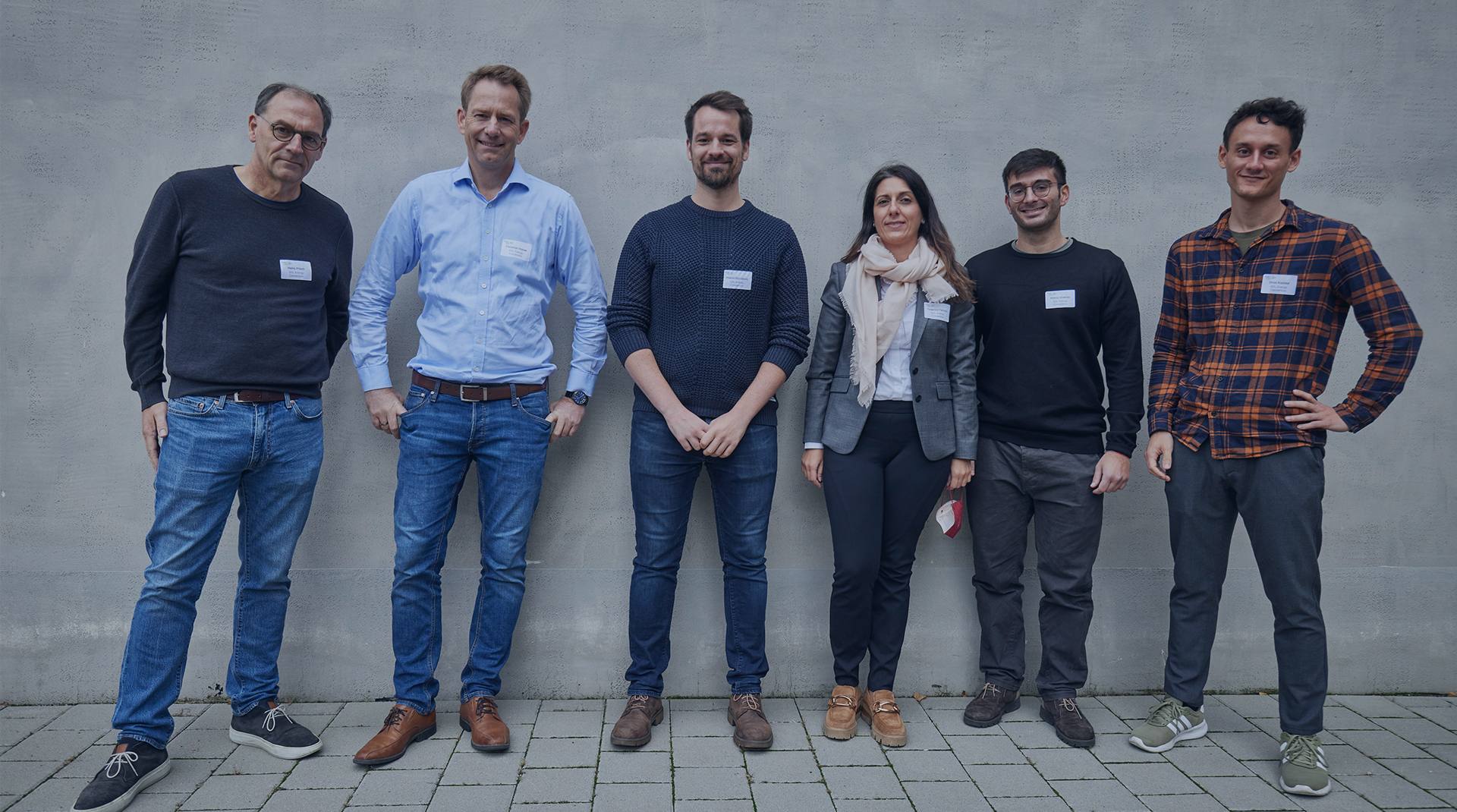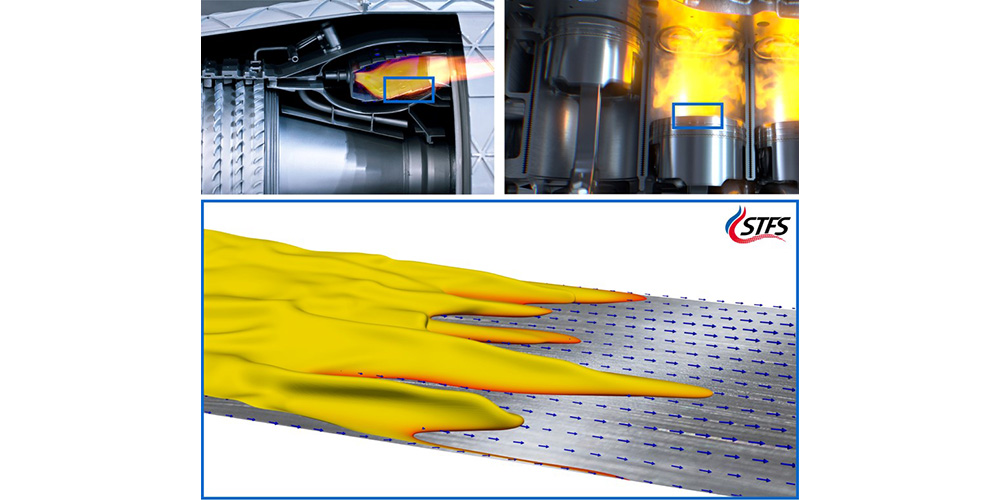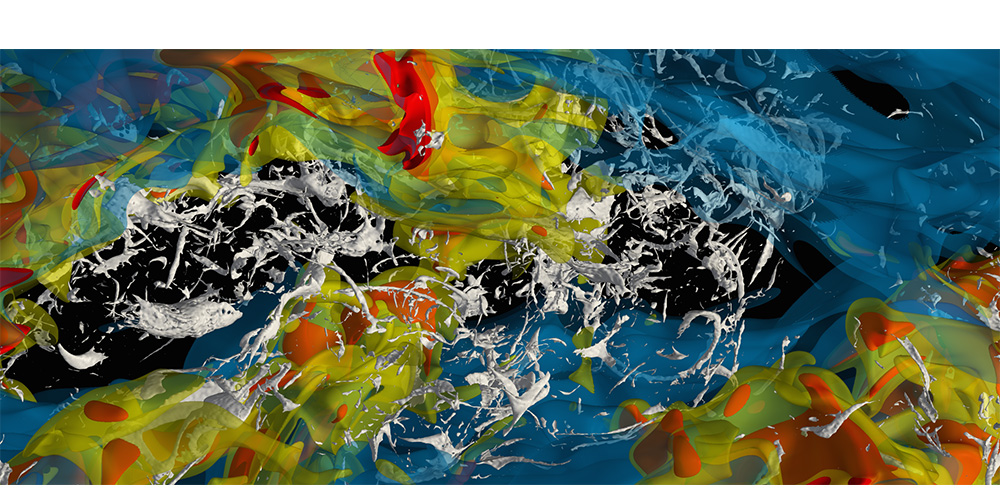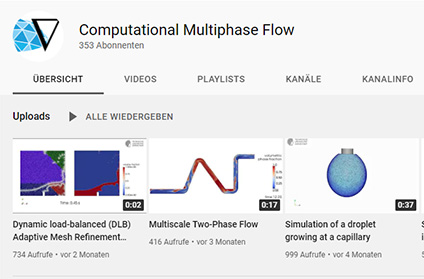SDL Energy Conversion
and RWTH Aachen University
Simulation and Data Lab
The SDL Energy Conversion enables computationally efficient simulations of real-scale combustion devices by developing HPC-ready rCFD software and methods by a co-design process.
In the foreseeable future, combustion will still meet the major part of the world’s primary energy demand, but technologies will need to change for low-carbon and carbon-free energy conversion, using synthetic fuels as key contributors. System redesigns will have to heavily rely on high-performance reactive CFD (rCFD) with sophisticated numerics and accurate predictive physical models.
However, combustion applications are particularly challenging with respect to HPC due to the strong non-linearities and the large ranges of scales arising from the highly-coupled turbulence and chemistry interaction, the large number of partial differential equations for a detailed description of the multiscale phenomena, and the inherent multi-physics aspects.
The SDL Energy Conversion aims to enable computationally efficient simulations of real-scale combustion devices by developing HPC-ready rCFD software and methods by a co-design process.
Highly optimized numerical approaches are being developed, tested, validated, and packaged in different forms. Resulting HPC modules are being optimized for Tier-2 architectures, also providing efficient usage on Tier-1 machines.
Several simulation frameworks will be used, such as the direct numerical simulation (DNS) code CIAO developed at RWTH Aachen University and the open-source code OpenFOAM, customized for large-eddy simulations (LES) and 3D URANS combustion applications at TU Darmstadt. Modeling-, numerics-, and HPC-aspects will be addressed.
We will provide, for example, libraries for combustion data-driven models based on reduced manifolds in terms of tabulated functionals and Lagrangian methods for point particle transport useful for dispersed solid and liquid fuels, non-diffusive scalar transport, and transported probability density function-based combustion models.
If you have questions for other groups or general questions like access to the HPC infrastructure, have a look at our support website.
Current research topics:
- Data-driven combustion modeling for laminar and turbulent flames
- Data-driven turbulence modeling for Large Eddy Simulations
- Evaluation of chemical kinetics and transport properties on heterogeneous architectures
- Development of Fortran-Python interface for machine learning (ML) inference on CPUs in collaboration with CSG Parallelism and Performance
- Inference of ML-based combustion models using GPUs in collaboration with CSG Parallelism and Performance
Training offers 2024:
Our repositories:
Our channels:
Gallery
Project partners
- Center of Excellence in Combustion (EuroHPC JU H2020)
- exaFOAM (EuroHPC JU H2020)
- CRC TRR 150
- CRC 129
- CRC 1194
- DFG FOR 2687
Members
Publications
2024
- Influence of adversarial training for super-resolution models (Ludovico Nista, Heinz Pitsch, Christoph D. K. Schumann, Mathis Bode, Temistocle Grenga, Jonathan F. MacArt, Antonio Attili), Physics Review Fluids.
- Can flamelet manifolds capture the interactions of thermo-diffusive instabilities and turbulence in lean hydrogen flames? – An a-priori analysis (Hannes Böttler, Driss Kaddar, Jeremy Karpowski, Federica Ferraro, Arne Scholtissek, Hendrik Nicolai, Christian Hasse), International Journal of Hydrogen Energy.
- multiRegionFoam – A Unified Multiphysics Framework for Multi-Region Coupled Continuum-Physical Problems (Heba Alkafri, Constantin Habes, Mohammed Elwardi Fadeli, Steffen Hess, Steven B. Beale, Shidong Zhang, Hrvoje Jasak, Holger Marschall), arXiv preprint.
2023
- Investigation of the generalization capability of a generative adversarial network for large eddy simulation of turbulent premixed reacting flows (Ludovico Nista, Christoph Schumann, Temistocle Grenga, Antonio Attili, Heinz Pitsch), Proceedings of the Combustion Institute.
- Application of dense neural networks for manifold-based modeling of flame-wall interactions (Julian, Bissantz, Jeremy Karpowski, Matthias Steinhausen, Yujuan Luo, Federica Ferraro, Arne Scholtissek, Christian Hasse, Luc Vervish), Applications in Energy and Combustion Science.
- Combined effects of heat loss and curvature on turbulent flame-wall interaction in a premixed dimethyl ether/air flame (Driss Kaddar, Matthias Steinhausen, Thorsten Zirwes, Henning Bockhorn, Christian Hasse, Federica Ferraro), Proceedings of the Combustion Institute.
2022
- A Case Study on Coupling OpenFOAM with Different Machine Learning Frameworks (), 2022 IEEE/ACM International Workshop on Artificial Intelligence and Machine Learning for Scientific Applications (AI4S).

 Turbulent Flame-Wall interaction under Creative Commons Attribution-NonCommercial 4.0 (© M. Steinhausen, TU Darmstadt)
Turbulent Flame-Wall interaction under Creative Commons Attribution-NonCommercial 4.0 (© M. Steinhausen, TU Darmstadt)  Two-dimensional simulation of thermodiffusively unstable, lean, premixed hydrogen flame (© L. Berger, RWTH)
Two-dimensional simulation of thermodiffusively unstable, lean, premixed hydrogen flame (© L. Berger, RWTH)  Three-dimensional simulation of a turbulent sooting flame (© A. Attili, RWTH)
Three-dimensional simulation of a turbulent sooting flame (© A. Attili, RWTH) 







